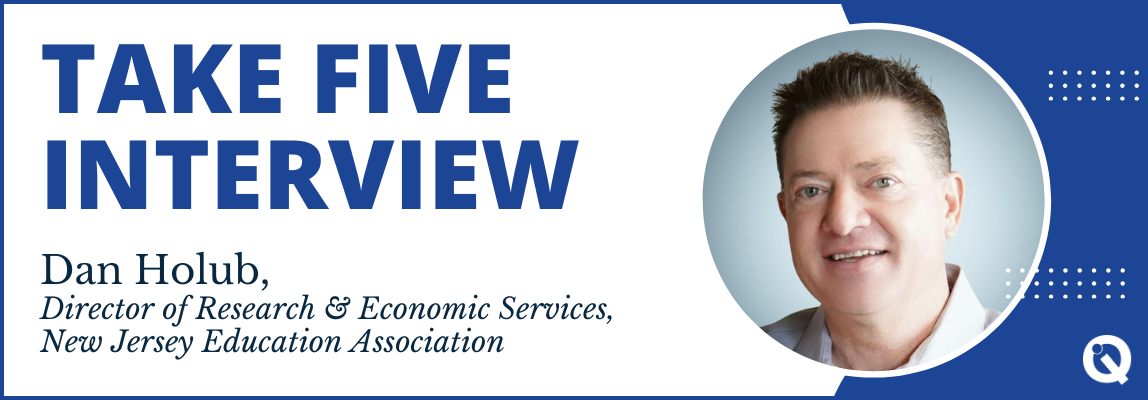Dan Holub, Director of Research and Economic Services for the New Jersey Education Association (NJEA), a member of the Quality Institute’s Purchaser Council.
What does the NJEA, which represents 200,000 members, see as its top one or two health care issues?
One of the biggest issues for us is the School Employees’ Health Benefits Plan. NJEA has a track record of working to ensure that employees and retirees receive high-quality care at the lowest possible cost. For example, we pushed for the introduction of Medicare Advantage plans for retirees, which lowered costs. In 2020, we also worked to pass Chapter 44, legislation that created a new health care plan for school employees. Since then, that plan has saved districts and employees roughly $467 million. But today premiums are rising rapidly again. We now need to revisit the plan to ensure it continues to deliver quality care at the lowest price possible.
Another ongoing issue is workplace health and safety. Our members’ working conditions are our students’ learning conditions. That means we need schools with clean air and water, sufficient staffing, and strong partnerships with school management. Improving school health and safety must be a continuous process involving everyone in the district.
When your members choose health care providers or facilities, what additional information or tools would help them select safe, high-quality care?
I don’t believe there’s a single tool that can fix this. What’s really needed is a stronger primary care system. Families should be able to rely on their primary care providers, who must be empowered to guide patients to quality, cost-effective care. Right now, too often, business interests in the health system push patients toward higher-cost providers without patients even realizing it.
Along with strengthening primary care, we need real transparency in pricing. Many New Jersey hospitals are still not in full compliance with federal price transparency rules. That’s why NJEA joined the New Jersey Coalition for Affordable Hospitals, which is promoting state legislation to address this problem. With better transparency, health plans can help direct members toward providers who deliver both quality and value. One piece of legislation, Assembly Bill 5376, is aimed squarely at this issue.
Prescription drug costs are a major challenge. What policy changes is NJEA supporting to make medications affordable while ensuring access to new treatments?
First, the state should return to strategies that we know work. In 2019, New Jersey conducted a reverse auction for prescription drugs, which saved about $1.5 billion over the years. Most experts say these auctions should be repeated every three years. Yet we haven’t had one since 2019 — meaning it’s been nearly seven years. We’re urging the State to act.
For context, a reverse auction is when the state’s pharmacy benefit manager (PBM) contract goes out for bid, and the lowest qualified bidder wins. It’s been highly successful here and in other states. We also believe formularies should be evidence-based, as they are in Europe, rather than skewed by rebates and industry incentives. Finally, PBMs should be required to act as fiduciaries — putting patients’ and plans’ interests ahead of profit. That would go a long way toward ending practices that drive up costs.
Children’s mental health has become an urgent issue in schools. What interventions are your members most supportive of at the local level?
Our members strongly support more investment in school-based psychologists and counselors. During the pandemic, federal funding helped expand these roles, but those resources are now gone, so we need the State to step in. Educators also need ongoing professional development around mental health so they can identify student needs and integrate healing-centered practices into their classrooms.
This includes mindfulness exercises, community-building activities, and restorative practices that help students grow without harsh disciplinary measures. Many educators also support the community school model, which brings health and family support services into schools themselves. Addressing children’s mental health in this holistic way supports students, families, and educators alike.
Finally, we like to ask a question outside your professional experience. Can you share a personal experience that has shaped who you are today?
I’d have to say I’m a product of strong public education. My mother was a public-school teacher, and many educators shaped my life. I remember my bus driver, Mr. Ary, who I remember asking me, for instance, about my grandfather’s health and who even attended my grandfather’s funeral. My first-grade teacher stayed in touch decades later and came to my father’s funeral 35 years after I was in her class. And my agricultural science teacher spent evenings and weekends teaching us and helping us succeed. These educators went the extra mile for their students, and their impact has stayed with me. I’m grateful for all they gave, and it fuels my commitment to support today’s educators.

